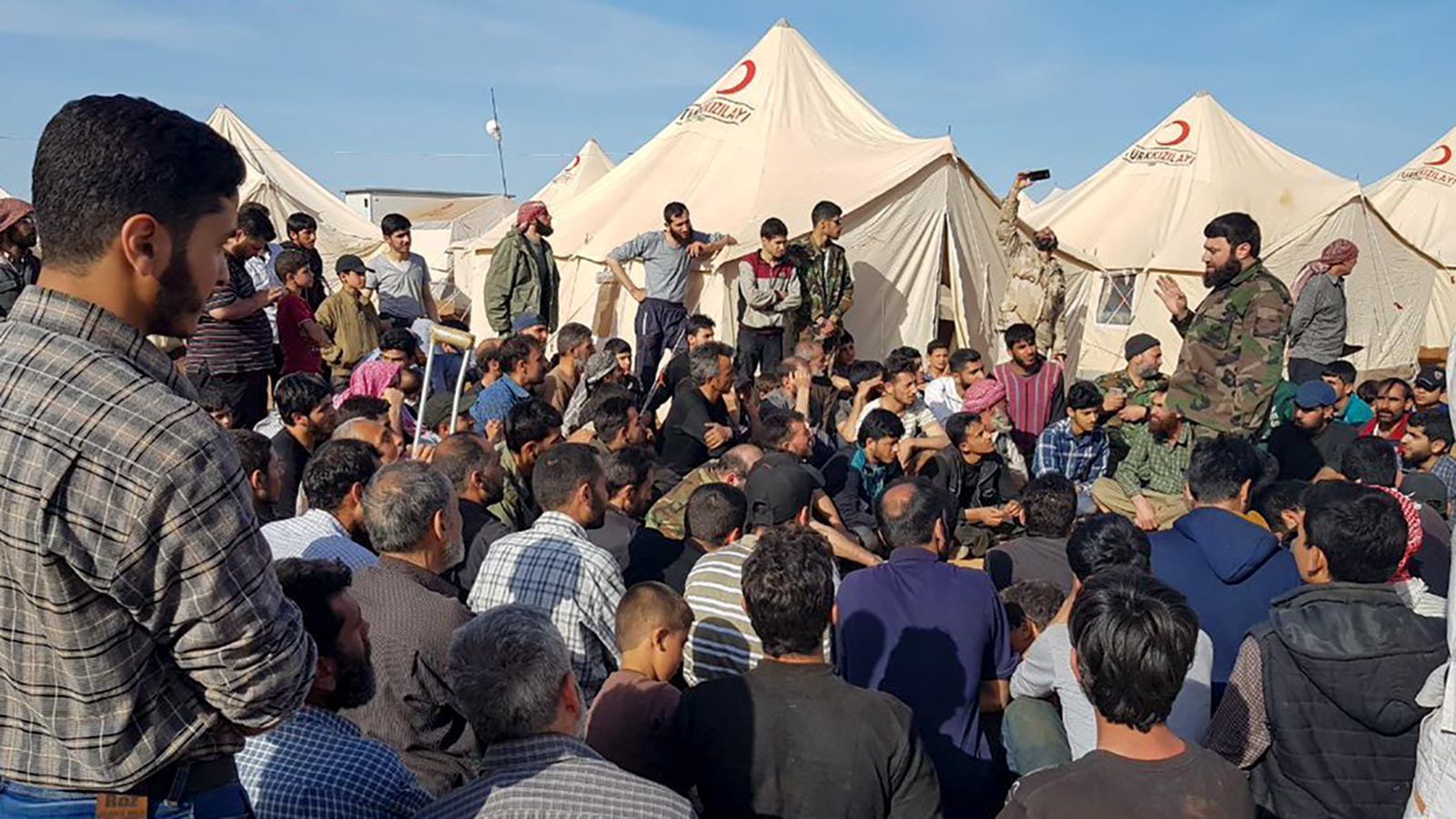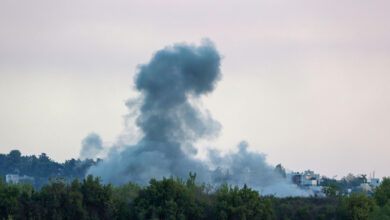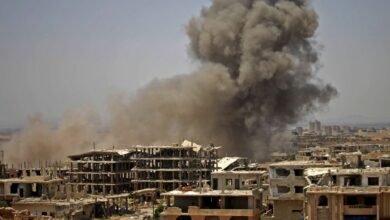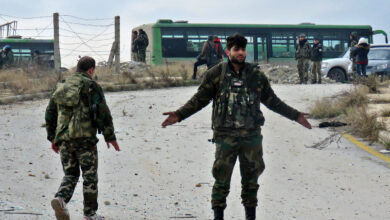Jaysh al-Islam reportedly agrees to leave Dumayr for Jarablus in northern Syria
Syrian state media reported Tuesday that opposition group Jaysh al-Islam agreed to leave another town east of Damascus, just days after evacuating their main bastion in Eastern Ghouta.
State news agency SANA said a new deal had been agreed for their exit from Dumayr, around 50 km (30 miles) east of Damascus.
The Islamist group has maintained control over the town since 2016 under a “reconciliation” agreement with regime forces, whereby they would not fire at each other.
According to SANA, the deal “provides for the departure of around 1,000 terrorists from Jaysh al-Islam to Jarabulus,” a town on the Turkish border controlled by Turkey and its Syrian opposition allies.
The group had already begun handing over heavy weapons as part of the agreement, SANA said.
Jaysh al-Islam has not yet commented on the deal that comes three days after Jaysh al-Islam evacuated Douma, the last opposition-held town in its onetime bastion of Eastern Ghouta. Days earlier, Douma was hit by a suspected chemical weapons attack that left dozens of people dead and hundreds injured.
After earlier deals saw opposition-held Ghouta towns evacuated in March, this final evacuation allowed the Syrian Arab Army to declare full control over Ghouta after a two-month assault. Under the deals, tens of thousands of fighters and civilians were bussed from the enclave to Idlib province, as well as to Al-Bab and Jarablus in northern Aleppo province.
Commenting on the Douma deal, Nicholas A. Heras, Middle East Security Fellow at the Center for a New American Security told The Defense Post that Jaysh al-Islam’s decision to leave was a pragmatic one.
“Jaysh al-Islam was surrounded and outgunned in Douma, and it had to choose between the certain death of the civilians under its care, the families of its fighters, or to leave for Turkish-controlled areas of northern Syria. It decided to leave,” Heras said.
An increasingly complex situation around Manbij?
The transfer of large numbers of fighters and civilians to northern Syria could further complicate an already-tricky situation in the Manbij area.
The Syrian Democratic Forces, backed by the U.S.-led Coalition against Islamic State, recaptured majority-Arab Manbij from ISIS in August 2016, and control of the town was handed to the SDF-aligned Manbij Military Council.
Meanwhile, Turkey’s Operation Euphrates Shield captured Syrian territory to the north and west of Manbij in 2016 and 2017, including the towns of Jarablus and Al-Bab, and its recent Operation Olive Branch campaign captured the mainly Kurdish Efrin enclave 100 km west of the town.
In recent months, more fighters, including those from Jaysh al-Islam, have moved to the Turkey-controlled areas, and a significant proportion of those groups have an Islamist character.
In March, U.S.-led Coalition Envoy Brett McGurk highlighted the “incredibly complex” situation around Manbij, saying that there is a “very deep ideological divide” between the “more Islamist” groups outside Manbij compared to the much more secular environment within the town.
McGurk said this situation on the ground would not be resolved by acceding to Turkey’s repeated calls for the mainly Kurdish People’s Protection Units (YPG) to leave Manbij.
The YPG makes up the backbone of the Coalition-backed SDF, but Turkey sees the group as terrorists inextricably linked to the outlawed Turkish Kurdistan Workers’ Party (PKK).
Turkey has repeatedly threatened to expand its military campaign against the YPG in Syria to Manbij – where U.S. forces have been deployed since March 2017 to reassure the Syrian Democratic Forces and deter hostilities between factions on the ground – and to other Syrian Kurdish-held territory as far as the Iraq border in the east.
“Erdogan said that he wants to move onto Manbij and beyond, deep into the SDF zone in northern and eastern Syria, and it is best to take him at his word,” Heras told The Defense Post.
A large part of Jaysh al-Islam is now under Turkish authority, Heras said, adding that time will tell if Turkey aims to “incorporate it into the Syrian proxy army that they are building in the Euphrates Shield zone.”
“Most likely the Turks will incorporate some part of Jaysh al-Islam into this force, and the most likely use for that force would be as a spear thrust against the YPG and the SDF,” Heras said.

International reinforcements
Although Turkey-backed opposition fighters have often fired at MMC forces near the frontline in the past, spokesperson Colonel Ryan Dillon said on Tuesday that Coalition forces have not received “any direct or indirect fire for several weeks now.”
An unnamed Pentagon official told military.com earlier this month that a planned U.S. reinforcement had taken place in Manbij. Turkey’s state-run Anadolu news agency claimed as many as 300 additional U.S. troops had been deployed near the front line that divides territory held by Turkey-backed Syrian rebels and the SDF-affiliated Manbij Military Council, but the Pentagon official said this estimate was overblown.
That came after representatives of the Democratic Federation of Northern Syria, the SDF and the Women’s Protection Units (YPJ) who met French President Emmanuel Macron in Paris said that Macron had told them that France would “reinforce” it’s military presence in the Manbij area in order to prevent a Turkey-led attack on the SDF.
However, Macron’s office later said that France is not planning a new military operation in northern Syria “outside the international coalition against Daesh,” using the Arabic acronym for ISIS.
Also on Tuesday, Foreign Minister Adel al-Jubeir reaffirmed Saudi Arabia’s willingness to deploy troops to Syria as part of U.S.-led efforts to stabilise the conflict-torn country.
With reporting from AFP












